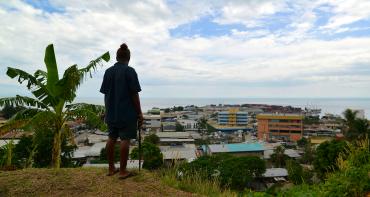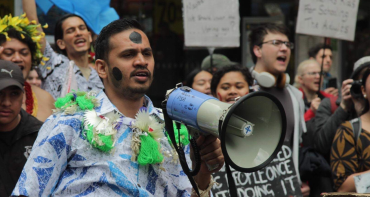Small states including those with financial services industries should play a greater role in the development of global financial rules, Seychelles’ Vice President, Danny Faure, told the Fourth Global Biennial Conference earlier today.

Small states including those with financial services industries should play a greater role in the development of global financial rules,
Referring to the Panama Papers, which he said “raise legitimate questions about the tightening of financial rules”, the Vice President said: “Let’s make sure we are part of the rule making and not only rule taking.”
Offshore finance was one of the many themes discussed as 18 representatives from Commonwealth countries, mostly with populations of less than 1.5 million people, came together to formulate strategies to improve social and economic growth.
The countries are joined at the conference, which is organised by the Commonwealth Secretariat, by major development partners including the World Bank, International Monetary Fund, OECD, African Union and United Nations.
#Seychelles VP Danny Faure - "#commonwealth has consistently championed the interests of #cwsmallstates" pic.twitter.com/2arfypm5wT
— The Commonwealth (@commonwealthsec) May 12, 2016
“Some countries represented here today have lost correspondent banking relationships because too often the rules around risk assessments are applied selectively, and there is a lack of engagement with small states on their needs in relation to the international financial system,” Vice President Faure said.
“Let us address these issues by committing to the highest standards possible in terms of exchange of information and anti-money laundering frameworks, while also exchanging best practices to better lead regulation both within our jurisdictions and internationally.”
In his speech, the Vice President also drew attention to the damage caused by Cyclone Fantala, which hit the Seychelles island of Farquhar only last month, and stressed the need for the adoption of appropriate vulnerability criteria in development frameworks to tackle climate change. Without this, he said, small states would have their hands tied behind their backs.
He acknowledged the Commonwealth’s ongoing work to develop a vulnerability index, which helps countries measure their resilience in the face of global shocks - economic and environmental.
On the issue of climate change, Samoa’s Ambassador Fatumanava Pa ‘O Leilei Luteru said “we have a crisis in paradise”. He talked about the issue of ‘climate refugees’ and reminded participants that a rise in sea level of one metre would see some small islands disappear.
The Ambassador emphasised the importance of climate change education and said that this should be a fundamental part of the curriculum. The Paris Agreement, he said, had placed adaptation and resilience at the heart of the new regime and his country would push for a vulnerability index.
Professor Adil Najama from the University of Boston asked what it meant to live in an age of adaptation to climate change. “It means the failure of mitigation has brought us here…we have missed the boat,” he said. He called on participants to suggest what a small states climate strategy would look like and said it would be powerful as a group strategy.
“Unless there is someone beating the drum and saying to the international community you committed to 1.5 degrees, it will be forgotten…you are the countries that have the most legitimacy to do this,” the professor said.
"We live in age of adaptation. We've missed boat on mitigation" @AdilNajam #cwsmallstates conference #climatechange pic.twitter.com/ctqJ3vAM4I
— The Commonwealth (@commonwealthsec) May 12, 2016
Seychelles’ Finance Minister Jean-Paul Adam moderated a session on Global Development and Local Realities and talked about the importance of small states’ access to affordable financing, such as concessional loans offered at a lower market rates for longer periods and which allow grace periods for payments.
#Seychelles Finance Minister Jean-Paul Adam discusses importance of #cwsmallstates conference with TV crew. pic.twitter.com/AifciNV8T7
— The Commonwealth (@commonwealthsec) May 12, 2016
Anthony Maruping, the African Union’s Commissioner of Economic Affairs suggested integration, diversification and value addition would enable small economies to become more resilient. He said there had been a shift towards including the private sector in efforts to achieve the Sustainable Development Goals (SDGs).
Dr Maruping said he was optimistic about development strategies to implement the SDGs because the African Union had taken a ‘bottom-up’ approach, involving the public and private sectors and civil society. He added: “Working together in the Caribbean, you could see a way clear to resilience and real growth.”
"We're hoping that #cwsmallstates working together will see a way clear to resilience and real growth" - Dr Maruping pic.twitter.com/Oghpm1V1So
— The Commonwealth (@commonwealthsec) May 12, 2016
Delivering the welcoming remarks Commonwealth Deputy Secretary thanked the Government of Seychelles for hosting the conference and said that it was an opportune time to discuss the development trajectory of small states following last year’s line-up of major international agreements.
Business & civil society have key role 2 help #cwsmallstates build resilience & advance dev. @CWEICtweets @commonwealthorg @commonwealthsec
— Deodat Maharaj (@deodat_maharaj) May 12, 2016
Progress in strengthening the resilience of small states, he noted, will depend on the careful and strategic reorientation of partnerships. “This is a critical issue we need to put our heads and political capital behind,” he said.



